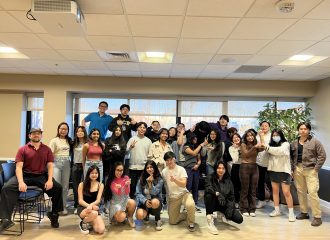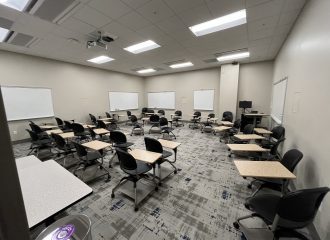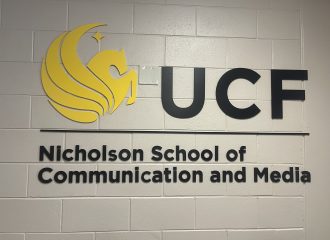By Derwin Sanchez Jr.
Another day in isolation. That was my attitude when the COVID-19 pandemic initially hit. Reality became monotonous, as each day was no different than the previous. Even though college professors and students would try to simulate face-to-face interaction through various digital media, it still felt fake. I could continue to talk about how terrible and exhausting this global pandemic has been, which no doubt would describe the opinion of most UCF students, but maybe it is healthier to reflect on some of the positive and meaningful events and activities that I have engaged in at UCF throughout 2020.
Zoom has become the platform in which meaning has been made for us, despite it not being a physical place.
What makes life meaningful? How do we create meaning as we go about our daily lives? The friendships we make, the stories we share, and the obstacles we overcome all give us something to live for. Unfortunately, the pandemic and the regulations that followed have radically restricted our ability to meet face to face over the past year. For many, social isolation has turned into a normal, constant reality. Despite the significant hurdle of the social isolation and loneliness that came with the pandemic, I am grateful to belong to a university that has taken measures to open spaces for students and faculty to interact, and, in the process, create meaning in their lives.
As Zoom has become the go-to online platform to hold classes, business meetings, and social events over the past year, both students and professors were tasked with adapting to a platform that was unfamiliar to them. For example, in the University Writing Center, where I work as a tutor, every staff member was required to immediately transition over to Zoom. It’s safe to say, then, that Zoom has become the platform in which meaning has been made for us, despite it not being a physical place. Everything from the conversations we have to the project ideas we share with one another have been completely transformed on Zoom. For instance, I had a class where the professor gave a lecture with subtitles enabled, making the lecture more accessible for all students, similar to how many prefer to watch movies on Netflix with the subtitles on.
There have also been countless times in which I have given a PowerPoint presentation to a class and allowed for questions to be asked throughout the talk, due to the “Chat” feature on Zoom. For the first time in academic history, those who observe their classmates presenting for the class can non-intrusively communicate during the presentation. The possibilities for creating meaning on Zoom are endless, and they have the potential to pull UCF students out of the humdrum reality of isolation into an interactive space for learning and real-time collaboration.
The University Writing Center has taken full advantage of this newly available online resource. Our use of Zoom has extended far beyond tutoring consultations. It is fair to say that these new additions to our writing center work were one of the positive outcomes of the pandemic. For example, we established several committees that worked to keep both students and faculty from across the university connected and engaged in various projects and activities.
Teaching and interacting with the students allowed me to engage in dialogue with topics that are important for writers of all levels, enriching my own knowledge of the subjects.
In my group, the workshop committee, we organized and ran different regularly-held online workshops designed for students and professors who want to learn more about a specific concept in writing. We hosted workshops on APA formatting and grammar thus far. These workshops were created to be highly interactive, and students were periodically sent into breakout rooms, where they participated in activities to help them better grasp the topic at hand. After completing the activity, students were encouraged to share their work with the others in their breakout group.
After having helped run two workshops so far, I have noticed that each major component helps to create meaningful experiences for the students who stop by. Our workshops enabled students to share ideas and interact with others, hopefully adding a degree of excitement and creativity in an unfortunately mundane and lonely reality. Teaching and interacting with the students allowed me to engage in dialogue with topics that are important for writers of all levels, enriching my own knowledge of the subjects.
Throughout 2020, the seemingly insignificant details that helped give everyday life meaning were taken away. However, during my time working remotely at the writing center, spaces for meaning and purpose have been created. The writing center’s virtual outreach to the broader UCF community has cultivated new experiences for countless students.
The end result of this is that we, as writing tutors, have branched out beyond mere tutoring. In the same way, other departments around UCF can also diversify and offer brand new resources and activities for students in their discipline.
Overall, my time working at the writing center and being a student at UCF throughout a global pandemic has caused me to rethink how we as students make meaningful connections with faculty members and with each other. In response to COVID-19 restrictions, we at the writing center have worked tirelessly to simulate real social learning and interaction to the best of our ability.
At the beginning , I was uncertain about how effective Zoom would be at engaging with students from across campus. I honestly thought that we would have a difficult time recruiting new students for writing consultations. However, the tutors’ ability to work together to plan and create innovative approaches for drawing students to the writing center has led to a new flourishing of writing center events and activities that would never have been created without this online shift. It seems clear to me that Zoom is an unbelievably useful tool in crafting meaningful experiences for students, and it likely will become an integral part of education in the post-pandemic age, opening up opportunities for learning that we would have never created otherwise.




